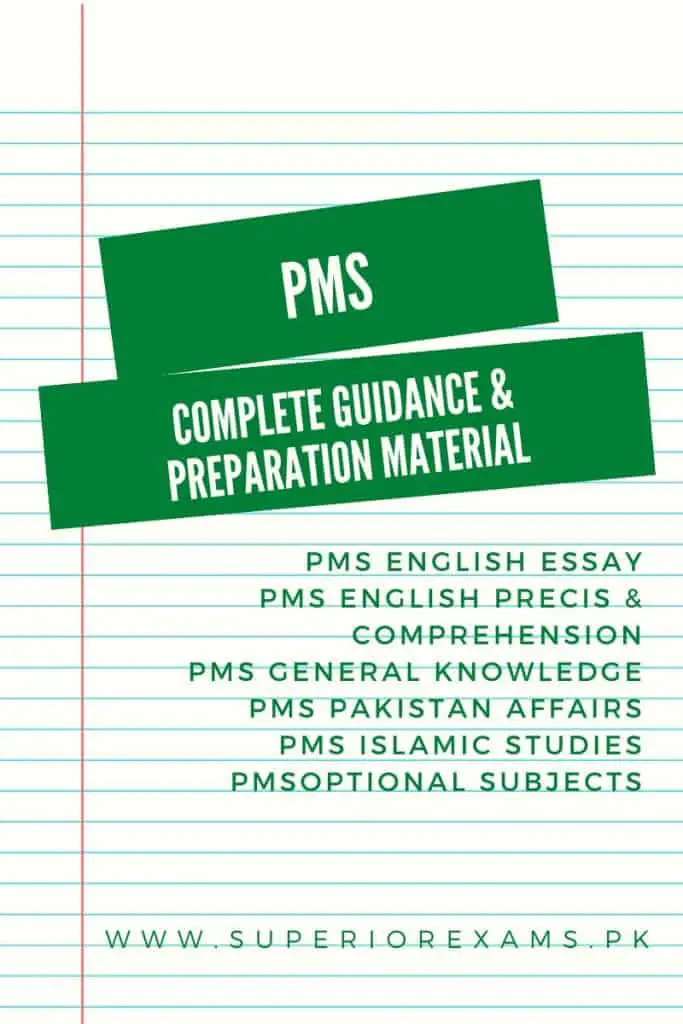
PMS stands for Provincial Management Services, it is the highest competitive exam conducted by provincial public service commissions of each province. Through this exam, suitable candidates are selected for provincial bureaucracy. PMS exam consists of a written examination of 1200 marks, candidates who clear the exam appear for a psychological assessment and an interview.
In each exam year, thousands of candidates apply but due to prevalent ignorance about the syllabus, exam material, and unauthentic preparatory material available in the market, most of the candidates do not pass the exam. Moreover, competition is rising each year as it is one of the best government jobs available for the youth of Pakistan.
PMS Exam requires consistent hard work on the part of the candidate, with complete guidance it can become a dream come true for many people as getting selected in provincial bureaucracy is the dream of many youngsters in Pakistan.
PMS Exam Frequently Asked Questions
To start of, here are some common questions and answers regarding PPSC’s PMS exam;
-
What is the difference between CSS & PMS?
The Central Superior Service exam is conducted by Federal Public Service Commission, whereas, the Provincial Management Service exam is conducted by Provincial Public Service Commissions mainly by PPSC regularly. CSS-selected candidates work under the federal government on the national level, meanwhile, PMS-selected candidates to perform their duties under the provincial government on the provincial level.
-
What consists of PMS Exam?
The PMS exam consists of a written examination of 1200 marks and then a psychological test along with an interview of 200 marks. The written test is divided into Compulsory Subjects of 600 marks and Elective/Optional Subjects of 600 marks. A candidate must secure at least 40% marks in each subject, and 50% marks in the total written examination to qualify for the interview. In the interview, a candidate must acquire at least 50% marks to get an allocation
-
Where does a PMS Officer serve?
PMS exam selected candidate works under S&GD department of the province, hence in the provincial bureaucracy.
The selected officer undergoes different training methods at the Management & Professional Development Department (MPDD), Lahore, for six months. The Civil Secretariat has announced various types of jobs for newly appointed PMS Officer. The Officer may be posted as:1- Section Officer General
2- Section Officer Planning
3- Section Officer Budget
4- Section Officer Inquiries
5- Section Officer Litigation
6- Section Officer Establishment
7- Section Officer TechnicalField Postings for a newly appointed PMS Officer are as under:
1- Assistant Commissioner
2- Special Judicial Magistrate
3- Sub-Registrar
4- District Monitoring Officer
5- General Revenue Assistant
6- Deputy Director Anti-Corruption -
When PMS Exam is conducted?
It is worth remembering that PMS Exam does not occur regularly. Punjab Public Service Commission takes the Combined Competitive Exam (PMS) most regularly in recent times. The number of vacancies also varies.
-
What is the age limit for the PMS Exam?
The age limit for PMS Exam is 21 to 30 years, the cut of date is calculated from the 1st of January from each exam announced year. Age relaxation for provincial or federal servants who served for 4 years in 35 years. For special persons, a maximum of 10 years of relaxation in the upper age limit is allowed as per Punjab Civil Servants Recruitment (Relaxation of Upper Age Limit) Rules, 1976.
-
What is the qualification requirement for the PMS Exam?
The qualification requirement for PMS Exam is a Graduate (Second Division) from a recognized University.
-
Where does PMS Exam held?
The PPSC PMS exam is held at Lahore, Rawalpindi, Multan, D.G Khan, Faislabad & Sargodha.
PMS Complete Subject Guideline
Syllabus for written examination is as under;
| Compulsory Subject | Exam Type | Marks |
|---|---|---|
| English Essay | (Subjective) | 100 Marks |
| English (Precis, Comprehension, and Translation) | (Subjective) | 100 Marks |
| Urdu (Essay, Precis, Comprehension, and Translation) | (Subjective) | 100 Marks |
| Islamic Studies / (Ethics For Non-Muslims) | (Subjective & Objective) | 100 Marks |
| Pakistan Studies | (Subjective & Objective) | 100 Marks |
| General Knowledge | (Objective) | 100 Marks |
All the candidates must take appear and pass all 6 compulsory subjects. Negative Marking is done and a 0.25 mark will be deducted for each wrong answer in the Objective (MCQ) paper on General Knowledge. Non-Muslim candidates have the option either to attempt a paper on Islamic Studies or “Ethics” (A combination of both Subjective & Objective).
| Group A | Marks | Group B | Marks | Group C | Marks |
|---|---|---|---|---|---|
| Commerce | 200 | Agriculture | 200 | Mathematics | 200 |
| Economics | 200 | Veterinary Science | 200 | Computer Science | 200 |
| Business Administration | 200 | Botany | 200 | Statistics | 200 |
| Public Administration | 200 | Zoology | 200 | Principle of Engineering | 200 |
| Group D | Marks | Group E | Marks | Group F | Marks |
|---|---|---|---|---|---|
| Physics | 200 | Political Science | 200 | Philosophy | 200 |
| Chemistry | 200 | History | 200 | Psychology | 200 |
| Geology | 200 | Law | 200 | Sociology | 200 |
| Geography | 200 | Mass Communication | 200 | Social Work | 200 |
All the candidates must take three of the optional subjects of 600 marks. Not more than one subject from each group. The minimum standard for the question papers will be of Graduate Level.
